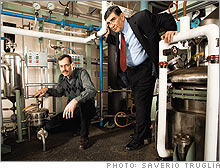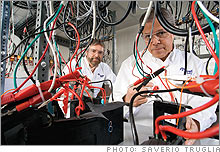Will green play in Peoria?This heartland city is betting its future on ethanol, wind and other environmental industries.(FSB Magazine) -- For a company poised to revolutionize an industry, Firefly Energy is pretty hard to find. It's temporarily headquartered in a former mental-health facility that's now part of a community college, a few miles north of downtown Peoria, and only a small paper sign announces its presence. Nevertheless, Firefly (fireflyenergy.com) is buzzing. The company has lined up $5 million worth of contracts with the U.S. Army, plus a deal with Swedish power-tool maker Husqvarna. What has these customers so excited is Firefly's new battery technology - lead-acid batteries (like the one in your car) that contain up to 80 percent less lead than the industry standard and therefore are lighter and last longer. The batteries, which should be on the market within a year or so, could radically boost the performance of hybrid cars.
If its offices are off the beaten track, Firefly's geographical setting may at first seem equally unexpected. The green-tech company, run by former employees of Apple (Charts), Caterpillar (Charts), and Motorola (Charts), is not in Silicon Valley, or even Chicago, but in Peoria, Ill., population 113,000. Famous primarily as the quintessential test market (the clich� "Will it play in Peoria?" dates to the 1920s, when vaudeville acts came here to gauge audience appeal), this Midwestern city is home to Caterpillar, the global construction-equipment giant. It is surrounded by fields of corn and soybeans and has an established distillery infrastructure from its days as a whiskey boomtown. These days, when Peoria's entrepreneurs and politicians gaze out over their city and the surrounding countryside, they see green. The city has created a tech incubator to help establish startups, many of them selling green products. Eleven ethanol plants are being planned, along with three biodiesel refineries, totaling nearly $2 billion in investments. Four wind-power companies - Horizon Wind Energy, Invenergy, Midwest Wind Energy and Navitas Energy - have proposed eight electricity-generating wind farms in central Illinois, four of them in counties just outside Peoria. As Peoria struggles to navigate the rugged transition from a Farmbelt and heavy-manufacturing economy into a green one, it could serve as an example to the rest of heartland America. So far the city is off to a good start. Peoria's metro area added 9,300 new jobs over the past four years. Sophia Koropeckyj, an economist with Moody's Economy.com, attributes much of the growth to several strong years of performance at Caterpillar. Metro Peoria's unemployment rate stands at 3.5 percent, well below the national average at 4.6 percent, and the city, according to IRS statistics, is gaining residents. Despite all the good news, Peoria faces an uphill battle. Many other communities are trying to become the next Silicon Valley or Austin, and doing so is a lot more complicated than it looks. Koropeckyj argues that the city will have a hard time attracting highly talented workers - the kind necessary for a green-tech boom. Only 20 percent of Peorians are college graduates, compared with the national average of 24 percent. Says she: "Central Illinois has just not been a terribly attractive place to be. There's always been this big vacuum-cleaner whoosh to Chicago." Fred Giertz, a professor of economics at the University of Illinois at Urbana-Champaign (uiuc.edu), points out that other cities in Illinois and throughout the region in states such as Iowa and Michigan are also trying to attract green energy companies - and that could lead to market saturation. He also worries that green energy on its own is not enough to lift the state or regional economy. Peoria remains determined. At Mayor Jim Ardis's State of the City address in January, several hundred Peoria business leaders and government officials gathered in the ballroom of the historic P�re Marquette hotel. Among the guests was Jim McConoughey, president and CEO of the Heartland Partnership (edc. central illinois.org), the umbrella organization that runs the local chamber of commerce, a regional economic development council, a tech incubator and other economic engines fueling the city's efforts. McConoughey, 45, whose insistently vibrating cell phone can seem at odds with his down-home demeanor, could barely walk two feet without someone shaking his hand or clapping him on the shoulder: Let's meet, let's talk, let's get going on this or that. |
Sponsors
|


